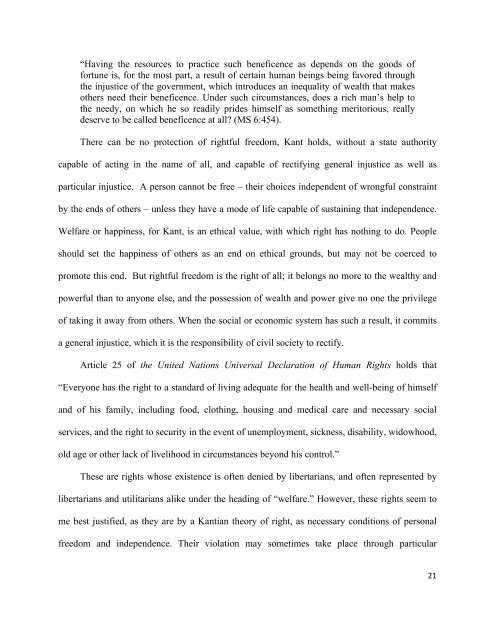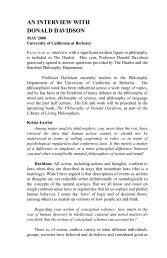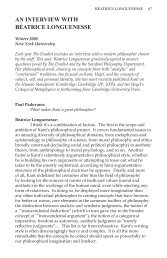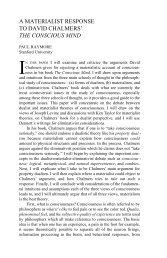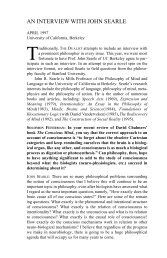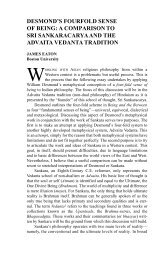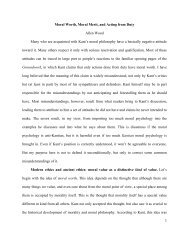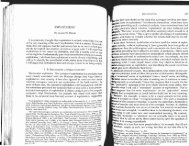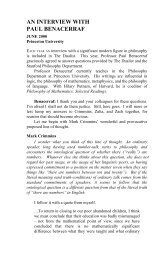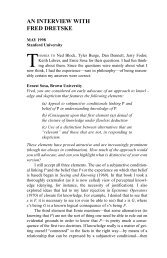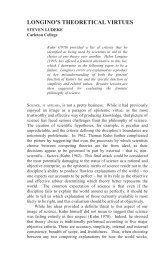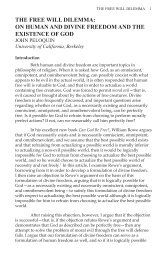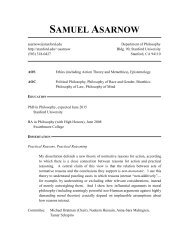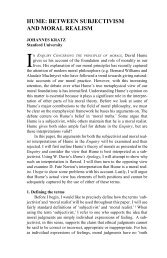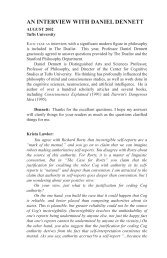The Independence of Right from Ethics Allen Wood Right and ethics ...
The Independence of Right from Ethics Allen Wood Right and ethics ...
The Independence of Right from Ethics Allen Wood Right and ethics ...
You also want an ePaper? Increase the reach of your titles
YUMPU automatically turns print PDFs into web optimized ePapers that Google loves.
“Having the resources to practice such beneficence as depends on the goods <strong>of</strong>fortune is, for the most part, a result <strong>of</strong> certain human beings being favored throughthe injustice <strong>of</strong> the government, which introduces an inequality <strong>of</strong> wealth that makesothers need their beneficence. Under such circumstances, does a rich man’s help tothe needy, on which he so readily prides himself as something meritorious, reallydeserve to be called beneficence at all? (MS 6:454).<strong>The</strong>re can be no protection <strong>of</strong> rightful freedom, Kant holds, without a state authoritycapable <strong>of</strong> acting in the name <strong>of</strong> all, <strong>and</strong> capable <strong>of</strong> rectifying general injustice as well asparticular injustice. A person cannot be free – their choices independent <strong>of</strong> wrongful constraintby the ends <strong>of</strong> others – unless they have a mode <strong>of</strong> life capable <strong>of</strong> sustaining that independence.Welfare or happiness, for Kant, is an ethical value, with which right has nothing to do. Peopleshould set the happiness <strong>of</strong> others as an end on ethical grounds, but may not be coerced topromote this end. But rightful freedom is the right <strong>of</strong> all; it belongs no more to the wealthy <strong>and</strong>powerful than to anyone else, <strong>and</strong> the possession <strong>of</strong> wealth <strong>and</strong> power give no one the privilege<strong>of</strong> taking it away <strong>from</strong> others. When the social or economic system has such a result, it commitsa general injustice, which it is the responsibility <strong>of</strong> civil society to rectify.Article 25 <strong>of</strong> the United Nations Universal Declaration <strong>of</strong> Human <strong>Right</strong>s holds that“Everyone has the right to a st<strong>and</strong>ard <strong>of</strong> living adequate for the health <strong>and</strong> well-being <strong>of</strong> himself<strong>and</strong> <strong>of</strong> his family, including food, clothing, housing <strong>and</strong> medical care <strong>and</strong> necessary socialservices, <strong>and</strong> the right to security in the event <strong>of</strong> unemployment, sickness, disability, widowhood,old age or other lack <strong>of</strong> livelihood in circumstances beyond his control.”<strong>The</strong>se are rights whose existence is <strong>of</strong>ten denied by libertarians, <strong>and</strong> <strong>of</strong>ten represented bylibertarians <strong>and</strong> utilitarians alike under the heading <strong>of</strong> “welfare.” However, these rights seem tome best justified, as they are by a Kantian theory <strong>of</strong> right, as necessary conditions <strong>of</strong> personalfreedom <strong>and</strong> independence. <strong>The</strong>ir violation may sometimes take place through particular21


